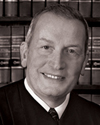Training Ground for the Presidency

Photo by iStockPhoto.com
When Lincoln was elected president in 1860, he had less experience in public office than almost every president who had preceded him. His career in government amounted to eight years in the Illinois General Assembly and another two in the U.S. House of Representatives.
What Lincoln did have, however, was a quarter-century of experience practicing law, much of it “riding circuit” in the often rough-and-tumble courts of central Illinois. Lincoln relied on his extensive legal experience to inform the difficult decisions he would be forced to make as president.
Political philosopher Edmund Burke once opined that “the legal profession renders its practitioners acute, inquisitive, dexterous, prompt in attack, ready in defense, full of resources. No other profession is more closely connected with actual life than the law. It concerns the highest of all temporal interests of man—property, reputation, the peace of all families, the arbitrations and peace of nations, liberty, life even, and the very foundations of society.”
Law practice certainly had such an effect on Lincoln. The numerous lessons he learned as a lawyer prepared him as president to confront those issues at the “very foundations of society.”
As a young lawyer, Lincoln quickly learned that success in the legal profession, and in politics, requires boundless energy and the ability to juggle multiple responsibilities. He had to balance the demands of his heavy caseload with his duties as an Illinois state legislator and emerging party leader. This served him well later as president, when he had the awesome responsibility of guiding the nation in multiple capacities as commander in chief, chief executive, legislative leader, chief diplomat and party head.
Another benefit of Lincoln’s legal career was that it offered him plenty of chances to develop his rhetorical skills. Lincoln had countless public-speaking opportunities in the courtroom, on the campaign trail and on the floor of the legislature. Without this experience and practice, he would have been no match for Stephen A. Douglas in their famous debates as U.S. Senate candidates in 1858. Douglas won that election, but the debates ultimately propelled Lincoln to the presidency.
Like any good lawyer, Lincoln worked hard at developing trial strategies, which later informed his military and political planning. During the Civil War, for instance, Lincoln communicated with his generals in the field using carefully worded interrogatories styled after the ones he had employed as a lawyer and designed to produce thorough and comprehensive answers.
Law practice also ingrained in Lincoln a judicious sense of timing. Experienced lawyers and politicians understand when to seize the initiative, and when to bide their time.
Political timing played an important role in Lincoln’s decision to issue the Emancipation Proclamation. Recognizing the controversial nature of the Proclamation, he shrewdly waited for a Union victory at the Battle of Antietam before issuing it in September 1862. That first version declared the federal government’s intent to free all slaves in areas of the Confederacy not under federal control by Jan. 1, 1863. The final version issued later that January identified the 10 Southern states where slaves would be declared free.
Perhaps most significantly, Lincoln’s legal experience prepared him for his greatest legal challenge as president: articulating a constitutional basis for suspending the writ of habeas corpus during the Civil War.
As we celebrate Lincoln’s presidential legacy, we are wise also to celebrate the noble legal profession that helped prepare him for greatness. In so doing, we might also help inspire our future presidents to achieve similar greatness.
See also:
A Docket That Reflects Then and Now
More Than Just a Bill of Lading
Frank J. Williams Retired Chief Justice of the Rhode Island Supreme Court and chief judge of the Court of Military Commissions Review Providence, R.I. He is founding chairman of the Lincoln Forum and a member of the United States Abraham Lincoln Bicentennial Commission. (Research assistance by Matthew J. Del Mastro.) Contact him at .(JavaScript must be enabled to view this email address).



